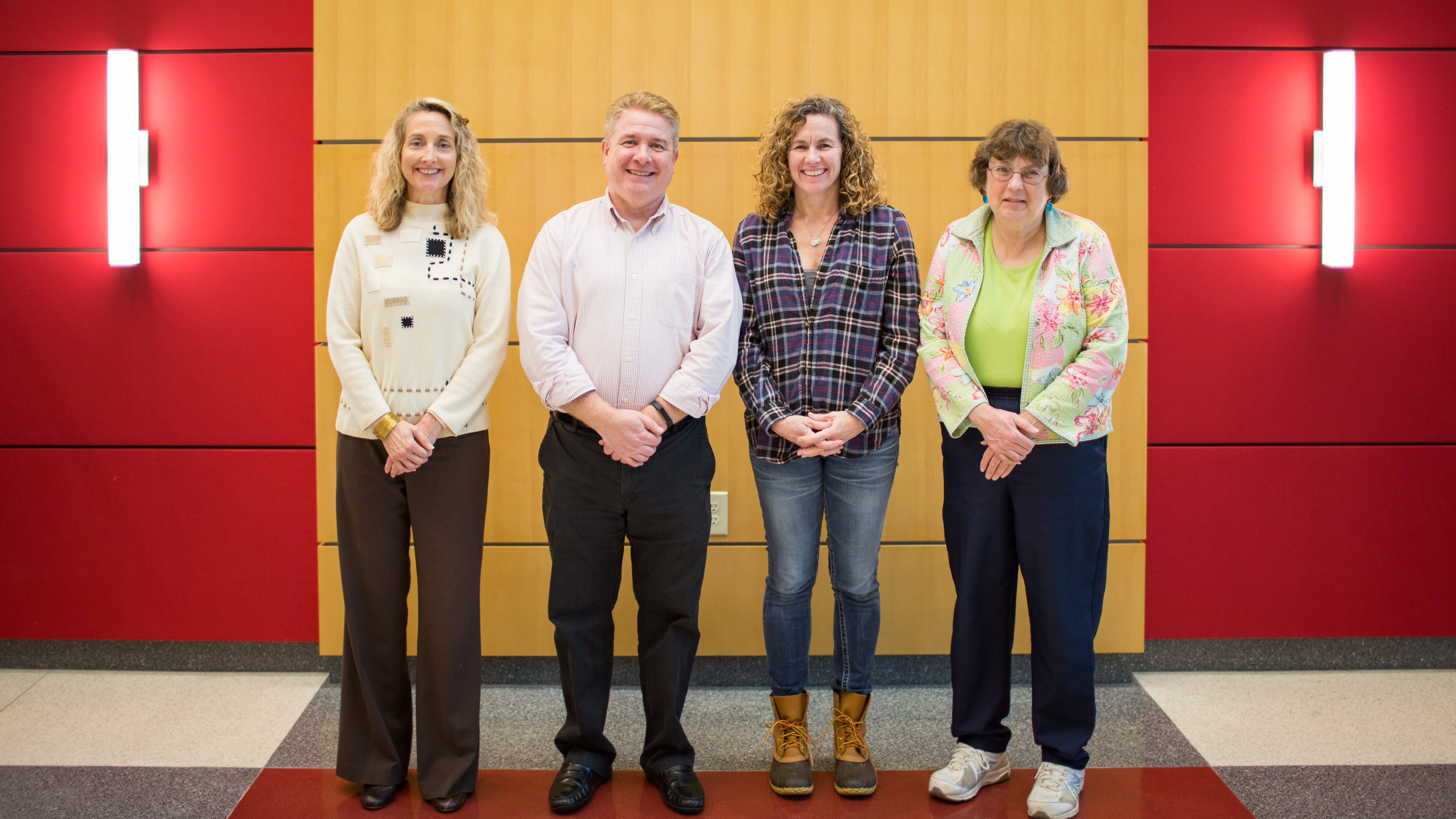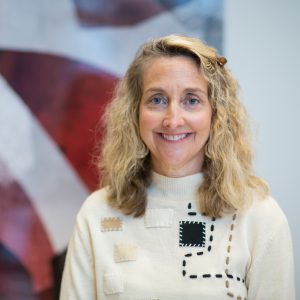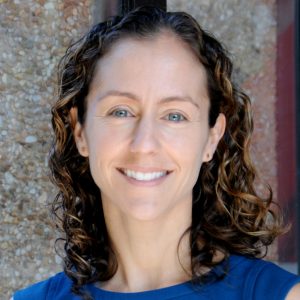OCIP Creates Culture of Quality Assurance

DELTA initiated the Online Course Improvement Program (OCIP) pilot in January 2018. The collaborative program between a cohort of dedicated faculty members and a group of DELTA staff is aiming to improve online courses to meet the nationally recognized standards of the Quality Matters (QM) organization.
QM developed a rubric of course design standards and a replicable peer-review process to provide guidance for improving the quality of online courses and a way to certify that quality across institutions. The research-supported and best practice-based standards and tools of QM are a driving force in online course quality.
OCIP is a 12-week program featuring face-to-face meetings and online discussions between the group where faculty members are designing and applying improvements to online courses with feedback given and received throughout the program. Following the pilot, the goal is for each faculty member to submit their course for an official QM course review and certification.
OCIP is designed to support both DELTA and NC State’s strategic goals to improve student success by helping create the first online courses at NC State certified for quality using QM’s rubrics, evaluation tools and peer-review process.
Lead Instructional Designer Bethanne Tobey facilitates the OCIP group, which is composed of faculty members and DELTA staff who are passionate about the quality design of online courses. In addition to Tobey, Arlene Mendoza-Moran, Rebecca Sanchez and Bethany Smith complete the group from DELTA.
 Director of Leadership in the Public Sector and DELTA 2016–2018 Faculty Fellow Amanda Edwards is serving as the faculty lead for OCIP. Edwards has completed the QM foundational courses and became the first QM-certified peer reviewer at NC State. Along with the cohort of faculty, Edwards is working to have one of her courses certified as well.
Director of Leadership in the Public Sector and DELTA 2016–2018 Faculty Fellow Amanda Edwards is serving as the faculty lead for OCIP. Edwards has completed the QM foundational courses and became the first QM-certified peer reviewer at NC State. Along with the cohort of faculty, Edwards is working to have one of her courses certified as well.
Tobey said this exceptional group of faculty members are champions for course quality. She noted OCIP is an intensive program and the willingness of faculty members to participate shows a huge commitment to their online students and creating an environment of excellence and quality.
The first cohort of OCIP faculty members:
Tracy Appling, Leadership in the Public Sector

“I’ve been teaching online at least five years now, and to have somebody sit down with me and help me figure out my learning objectives and making them match the goals of what I’m trying to get the students to accomplish is more guidance than I’ve ever had in online teaching. The program I teach for is delivered fully online and is designed for adult learners; therefore, the philosophy and course design has a huge impact on whether they have a good experience in online learning. I want my course to be enjoyable and for the students to maximize their learning potential. I feel if I get the QM certification, I will be able to present the best work possible to the students and provide the optimal learning experience.”
Cheryl Block/Ana Gray (co-teaching), Department of Foreign Languages and Literatures
 “We see quite a bit of value in participating in the OCIP pilot. For example, training instructors regarding alignment between the foundation of the course and components (testing). An advantage for instructors and learners is the exposure to cutting edge standards in instruction. As we reach out to a very specific audience (students of health professions), it is crucial that not only we deliver the information but that it is received by the students and is user-friendly and clear. The emphasis on design has helped us tremendously with the organizational aspect of teaching online.”
“We see quite a bit of value in participating in the OCIP pilot. For example, training instructors regarding alignment between the foundation of the course and components (testing). An advantage for instructors and learners is the exposure to cutting edge standards in instruction. As we reach out to a very specific audience (students of health professions), it is crucial that not only we deliver the information but that it is received by the students and is user-friendly and clear. The emphasis on design has helped us tremendously with the organizational aspect of teaching online.”
Marne Coit, Department of Agricultural and Resource Economics
“I’m grateful to participate in the first group of courses and instructors at NC State going through this process. Having worked closely with DELTA to develop my online class, I share and applaud its goal of supporting instructors to develop high-quality learning experiences for students. Being certified by QM is the next step to improving the class even more, and ensuring that students have the best possible experience in an online course. Through this platform, I’m able to reach a wider student population, including non-traditional students, which has enriched the class overall. DELTA has made a real difference for me and my students.”
Jill Grifenhagen, Department of Teacher Education and Learning Sciences
 “The OCIP pilot and Quality Matters certification process is providing me with necessary, research-based professional development in designing online courses. As I redesign a course based on the QM rubric, I am not only improving that course but gaining valuable skills and knowledge for designing future online courses. The pilot’s cohort model allows me to work collaboratively with colleagues across NC State’s campus to support one another and share best practices. Finally, the fact that much of the content of the pilot program is delivered online has put me in the position of an online learner. Because I had never had this experience before, this new role is valuable in understanding my students’ perspectives. I personally am excited to improve my teaching and help lead the NC State faculty toward higher standards for online coursework.”
“The OCIP pilot and Quality Matters certification process is providing me with necessary, research-based professional development in designing online courses. As I redesign a course based on the QM rubric, I am not only improving that course but gaining valuable skills and knowledge for designing future online courses. The pilot’s cohort model allows me to work collaboratively with colleagues across NC State’s campus to support one another and share best practices. Finally, the fact that much of the content of the pilot program is delivered online has put me in the position of an online learner. Because I had never had this experience before, this new role is valuable in understanding my students’ perspectives. I personally am excited to improve my teaching and help lead the NC State faculty toward higher standards for online coursework.”
Paul Mulvey, Department of Management, Innovation and Entrepreneurship
 “After offering a handful of online courses, I believed I needed help to improve my online course to match the level of my in-person courses. The OCIP and the QM standards are the perfect vehicles to help improve my online course. The excellent guidance provided by Bethanne, Bethany, and their colleagues through the OCIP pilot is helping me to redesign my Human Resource Management course from viewpoint of the online student. However, because many faculty use Moodle and other learning management systems for in-person and online courses I feel that this program will significantly improve both and subsequently, student learning and retention.”
“After offering a handful of online courses, I believed I needed help to improve my online course to match the level of my in-person courses. The OCIP and the QM standards are the perfect vehicles to help improve my online course. The excellent guidance provided by Bethanne, Bethany, and their colleagues through the OCIP pilot is helping me to redesign my Human Resource Management course from viewpoint of the online student. However, because many faculty use Moodle and other learning management systems for in-person and online courses I feel that this program will significantly improve both and subsequently, student learning and retention.”
Future Vision
For Edwards, participating in OCIP as the faculty lead has helped her further her own goals of improving an online section of a political science course. She has heard QM discussed by political science scholars and distance education faculty at conferences and was excited for the opportunity to participate in OCIP to see what it could do for her own course in terms of student learning and satisfaction.
“With QM, the course is designed so students can see the learning objectives, the assessments, and how everything aligns…students, therefore, go into the course knowing exactly what the expectations are and they will probably be happier and have a much better learning experience,” Edwards added.
Grifenhagen added on the importance of expectations, “I can already tell how the design principles from QM will make the course experience more accessible and effective for my students. The guidelines make the content clear, and the course alignment reflects adult learning theory as students are able to see the purpose behind course activities and assignments.”
During the OCIP pilot, faculty are learning how to align each piece of their course. The idea is that the OCIP workshops will mirror a QM course. “There is online work every week, just like a QM course, so it’s giving an example to everybody about what a QM-certified course would look like because we are going through one,” said Edwards.
Edwards noted the OCIP pilot is a learning process where the collaborative efforts between faculty and DELTA staff have been incredibly important. She credited Tobey with creating a design template to help faculty restructure their courses to ensure they will pass a QM peer review.
Edwards is positive about the impact OCIP will have on her own courses as well as NC State as a whole. “OCIP is one other aspect of reaching out so that Online and Distance Education becomes more accessible for faculty across the university, and it makes sure our online offerings are high quality, which is really important,” she said.
For the future of OCIP, Tobey said the group plans to make adjustments based on the faculty cohort’s feedback to continue offering the program to small groups of dedicated faculty during fall and spring semesters with the goal of getting excellent, quality courses officially recognized through QM certification.
Recognizing this first group of OCIP faculty for their dedication to providing online NC State students with purposeful and engaging courses was important for Tobey. “The QM certification of their courses proves the faculty’s commitment to quality and their students,” she added.


